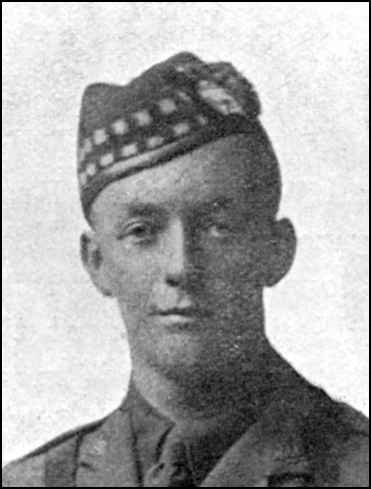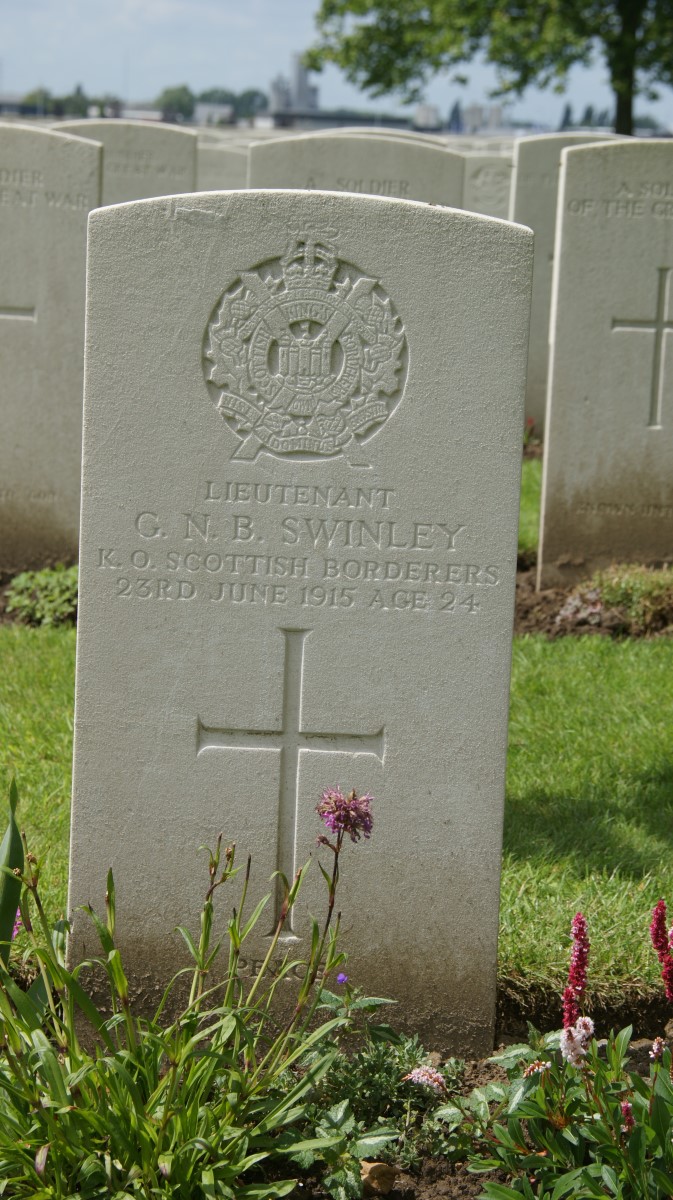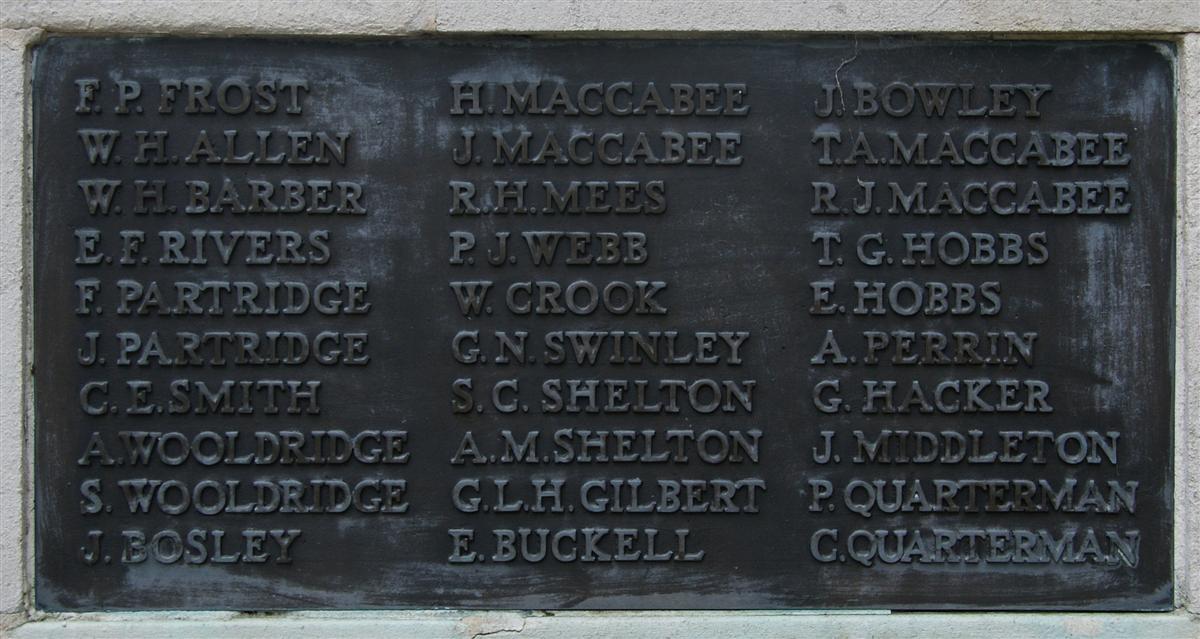Gordon Noel Balfour Swinley
Lieutenant Gordon Noel Balfour Swinley, 2nd Bn, King’s Own Scottish Borderers.

Gordon Swinley |
Gordon was sent to school in England, first to Clifton College (1899-1902) and then to Newbury Grammar School (1903-1905) after which he attended the United Services College (1905-1908). Thus he was, unusually, a fellow old boy with two of the most notable names associated with the post war commemoration of the Great War’s casualties: Earl Haig (Clifton) and Rudyard Kipling (United Services).
While at Newbury he was under the guardianship of Mrs Fellowes who lived at The Rosery, 8 Donnington Square. His younger brother Roland was also a guest of Mrs Fellowes at the time of the 1901 census (while Gordon was at Clifton). Mrs Fellowes may have been a relative or family friend, but she does have several student boarders in 1911, so it may be that she was supplementing the household income by taking in young lads like Gordon, whose families were overseas.
However,It seems that there was a significant fammily connection to Newbury because it was to Newbury that his mother came following the death of her husband in 1909, by which time young Gordon had left the town. Mrs Swinley rented a house in Craven Road, long known as ‘Glenavon’ but now simply as 148 Craven Road.
After school Gordon worked in London for a while before setting out to India. He sailed from Southampton on the P&O liner SS Delhi, but on 12 December 1911 the Delhi ran aground off the coast of Morocco in atrocious weather. A five day rescue effort involving French and British Navy ships ensure that the passengers and crew were saved, though a number of rescuers died owing to the dreadful weather conditions. Also on board was the King’s sister, Louise, Duchess of Fife with her husband and two young daughters. P&O sent another liner the SS Medina to complete the voyage to Bombay, for which the Royal Navy provided an escort. Before long Gordon had to return home as a result of ill-health, after recovering he left the UK again, this time for Morocco.
When war was declared Gordon was still in Morocco working as the Acting British Vice-Consul in Marrakesh, but, determined to serve his country more actively, quickly returned home and enlisted on 29 October 1914 as a Trooper in 2nd King Edward’s Horse. He was quickly spotted as potential officer material and was discharged on 24 November to ‘obtain a commission in the KOSBs’.This was the acronym commonly used to refer to the King’s Own Scottish Borderers. Gordon duly applied for a commission with the KOSB, an application that would not have been harmed by a character reference from ‘C J Baker, Vice Admiral (Ret)’. Following an interview he was recommended for a commission on 12 December.His attestation papers from the King Edward’s Horse give a few physical details; he was tall for the time (5ft 11½ins) with blue eyes and light brown hair.
He was officially commissioned on 16 December as a Cadet of the Officer Training Corps with the rank of Temporary 2nd Lieutenant(on probation). On 5 May, having completed his training he was confirmed in his rank.To this point he was serving with the 3rd Battalion, KOSB, a home battalion of the regular force, one which never went overseas serving instead in a training and recruitment role.Soon Gordon was posted to the 2nd Battalion, then serving in Belgium south of Ieper (Ypres); on 21 May 1915 he landed in France and joined his new battalion on 27 May in their trenches alongside the Yser Canal.
According to the official record at the Commonwealth War Graves Commission Gordon died on 23 July 1915 after less than two months in France, his mother submitting a death notice to the local paper:
Newbury Weekly News, 1 July 1915 – Killed in Action
SWINLEY – Killed in action in France, on the 23rd inst, Gordon Noel Balfour Swinley, Lieut, 3rd, attached 2nd, KOSB, aged 24, eldest son of the late Gordon H Swinley, of Mijika, Assam, and Mrs Swinley, Glenavon, Newbury.
Further information was given in the news columns:
Newbury Weekly News, 1 July 1915 – Local War Notes
The death of Lieut Gordon Noel Balfour Swinley, has evoked widespread expressions of regreat and sympathy. Little more than a month ago he was at home in consequence of the death of his father in India. He went out with his regiment, the KOSB, to France shortly afterwards, and was killed in action immediately upon going to the Front. He was a stalwart young fellow, a fine type of the young manhood of England, now alas! paying such a terrible tool to the dreadful demands of war. It is almost impossible to realise that one so recently amongst us full of health and vigour, should now be numbered among those who have answered the last roll-call.
The circumstances of his death are a mystery, the battalion war diary entry for 23 July records a long but uneventful march from billets in ‘Zeveeten’ [probably Zevecoten, an adjunct of Reninghelst, not shown as such on modern maps] via Boeschepe to new billets in Steenvoorde – with no casualties reported. Gordon was not killed in action with his battalion on that day!
However, several papers surviving in his records at the Public Record Office give his date of death as 22 July, one day earlier. On that day the war diary records the battalion’s march to Zeveeten having been relieved in the trenches the day before. This would be closer to the front than the following day’s march and hence more likely to be spotted by the enemy with the inevitable result of a few shells interrupting their journey. Thus it appears that bit more likely a day for the battalion to suffer casualties (the diary is of little help as it is not very forthcoming regarding day to day casualties).

Gordon's grave in Belgium. |
Perhaps Gordon was liaising with the artillery or even just visiting a chum stationed there and fell victim to shelling? Another possibility is that he was still at the front, perhaps introducing the battalion’s replacement in the line to the section they would be manning and was wounded by a shell or sniper, evacuated to an advanced dressing station at Lankhof, where he died.
The discovery of his remains post-war should have been of little surprise as the War Office informed his mother in the days following his death that he was buried there. Indeed, the method of identification of the remains as his was based on his buttons – hardly unique to one man, but very possibly they were KOSB buttons and he was the only KOSB officer known to be buried at Lankhof.
The local paper published a lengthy obituary penned by Edward Sharwood-Smith (ESS), headmaster of the Grammar School:
Newbury Weekly News, 1 July 1915 - Lieut. Gordon Swinley.
An Appreciation
Lieutenant Gordon Noel Balfour Swinley, 3rd Batt (attached to 2nd) King’s Own Scottish Borderers, was killed in action in France on June 22nd. He was the eldest son of the late Gordon H Swinley, of Mijiak, Assam, and of Mrs Gordon Swinley, of Glenavon, Newbury, and grandson of the late Major-General Swinley and Professor Hulton Balfour, of Edinburgh. He was born in India in 1890 and was educated at Clifton College, Newbury Grammar School and the United Services College, Windsor*. He obtained his commission as the beginning of December having previously served as a trooper in 2nd King Edward’s Horse.
When Gordon Swinley came to see me in November last to tell me that he had thrown up his work in Morrocco in order to join the Army, he said to me, “I could never pass a written examination, but I can lead men.” And I remember thinking to myself at the time that I had never known one of whom it could be more truly said that he was a born leader of men. It is possible that he was no good at examinations. I do not know, there are many such, and it is so much the worse for examinations – and I do not greatly care. But I do know that I have met few more fitted to play a noble and intelligent part in life’s varied game than Gordon Swinley. And if, as is my firm belief, the chief end of education is to live nobly, nobody was better educated than he, but it was from inner sources that he drew his powers. I should imagine that at his various Schools he gave more than he received.
And few can have gone through so many adventures in so short a space of time. Danger and he were constant companions, and he seemed to regard it with an amused contempt. His companions speak of him as “radiantly happy” in the trenches. In the past four years he underwent two operations – one nearly proving fatal – he was wrecked with the “Delhi” on a barren and dangerous coast; he suffered from a serious illness in India, was invalided home, and within a few days of his arrival broke his collar-bone badly while playing at “rugger” against his old School. He went out to a responsible post in a difficult and distant part of Morrocco, and after a short, but happy career there, joined the Army, and now lies dead in a soldier’s grave in France at the age of twenty-four.
I do not know what I admired most in him, the fine influence he exercised on his contemporaries; the generosity of his nature; the splendid pluck with which he faced his many trials, or his transparent sincerity of character. To me he seemed moulded of the same stuff as his great namesake General Gordon; he had the same directness, the same simplicity. His brother officers were deeply attached to him, as indeed who was not who knew him? Had he lived, he would have made an ideal officer. Now that he is dead, we can speak of him in no exaggerated phrase as one who lived and died without fear and without reproach. True son of noble father, he has not waited long to follow him! I who knew him and loved him, and learnt far more from him than I ever taught him, have thought it well to offer this slight tribute to his memory. ESS
*The United Services College (USC) was not located at Windsor. Originally at Westward Ho! in Devon it moved in 1904 to Harpenden, Hertfordshire. In 1906 it was taken over by the Imperial Services College at Windsor; this was during Gordon’s period as a pupil so he may have transferred to Windsor, though the USC did not close for good until 1911.
Gordon’s remains lie today in grave XXX. G. 19 at New Irish Farm Cemetery; his mother asked for a single word epitaph to be added to his headstone – ‘PEACE’.

Gordon's name on Newbury War Memorial (centre) |
Locally Gordon is remembered on tablet 2 of the Newbury Town War Memorial, the memorial board and roll of honour in St Nicolas’ Church, Newbury.
He is also commemorated on the Newbury Grammar School Memorial in the reception area of St Bartholomew’s School.
Family
Mona Marion Balfour Swinley married Henry Walter Huntingford Richards in 1915. Henry was an electrical engineer who worked for several railway companies eventually becaming the Chief Engineer of the London and North Eastern Railway. He left the LNER in 1947 when the railways were nationalised, but he may have had a more personal reason for Mona died in the same year.
Roland Frith Balfour Swinley joined the Navy on 15 September 1908, aged 12, almost certainly as a pupil/cadet at the Royal Naval College, Osborne (Queen Victoria’s Isle of White residence) before moving on to Dartmouth Naval College two years later. He served throughout the Great War on various Destroyers (HMS Larne, HMS Milboork, HMS Musketeer, HMS Nymphe), failing to distinguish himself in any way. Some reports from his commanding officer suggest he may have chosen the wrong career: ‘Disappointing officer, has plenty of ability but is of a lazy disposition. Plenty of commonsense. Not very intelligent.’; ‘Good knowledge of his duty & has grip on his division. A little slow at times.’ Nevertheless he remained in the Navy and rose to the rank of Commander before leaving the service on 23 July 1945 after a series of health problems; he was place on the Retired List with the honorary rank of Captain. After the war he worked as an estate agent in London before retiring to Newbury where he died in 1970.
Caspar Silas Balfour Swinley was 18 in 1916, facing conscription he opted to follow his brother Roland into the Navy where he had a far more illustrious career. By the end of WW1 he was a Sub-Lieutenant, then Lieutenant (acting 1920, full 1921), Lieutenant Commander (1928) and Commander (1934). In 1940 he was commanding the destroyer HMS Isis at the Battle of Cape Spada when the Italion light-cruiser Bartolomeo Colleoni was sunk by the Australian cruiser, HMS Sydney. FOr his part in this action Caspar was awarded the Distinguished Service Cross. In November 1941 he was awarded the Distinguished Service Order for ‘gallantry and distinguished services in operations in Greek waters’. The following year he was promoted to Captain. He remained in the Navy after the war and, in February 1951, was appointed as an ADC to King George VI. He was not long in the job and retired in July 1951 as a Commodore. However, he remained active and became Chief of Staff of the Pakistani Navy. In 1953 he returned to England and settled in Gloucestershire, where he died in 1983.

Find a memorial :
| Died this day: | |
| 02 March 1918 | |
| N G Burgess | |
| Newbury |

Like this site? Show your appreciation through a donation to a great charity.